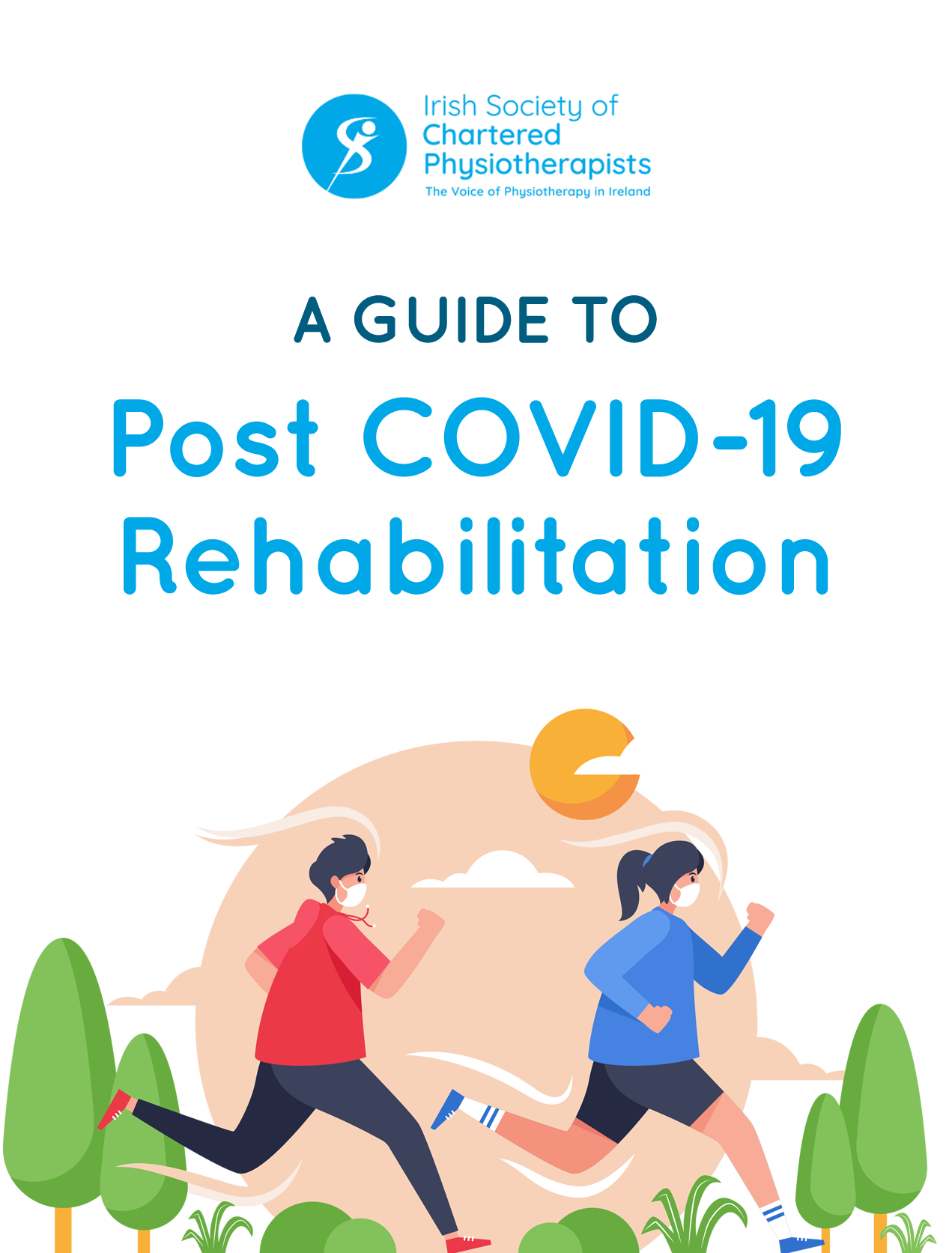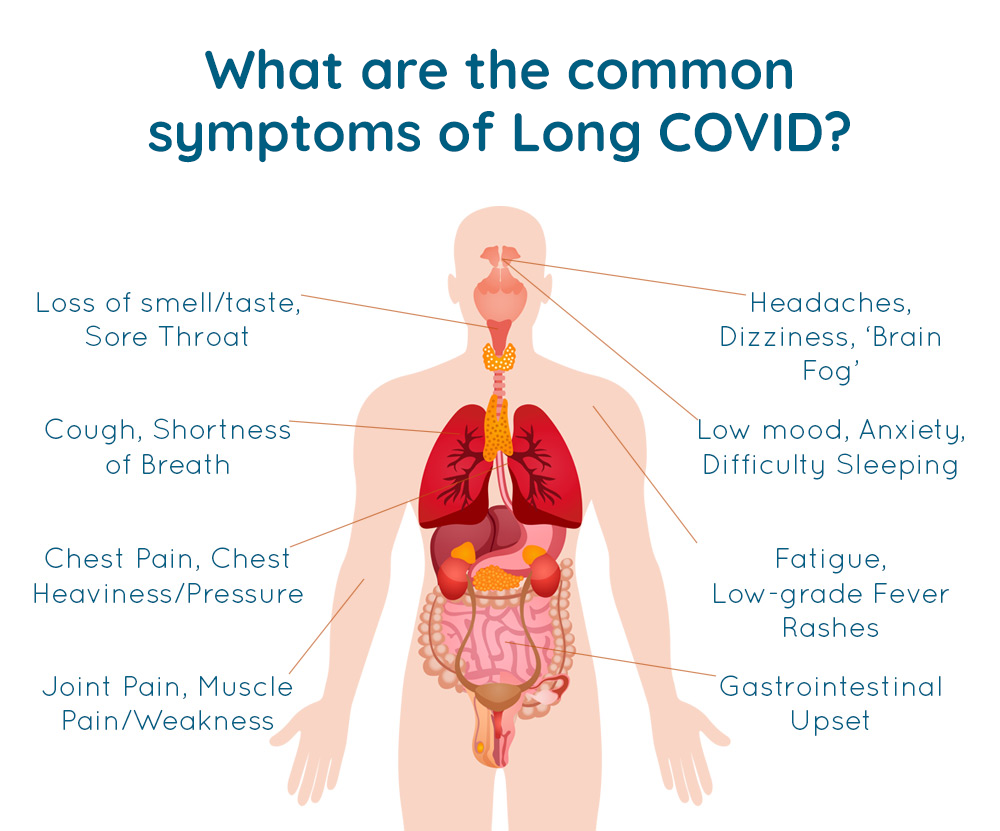From the ISCP in Partnership with the
Construction Industry Federation of Ireland
Learn MoreFind a Physio
Avoiding common common conditions for Builders & Tradespeople
We have created this resource to act as Ireland’s leading resource for people experiencing the after effects of their COVID-19 infection. COVID-19 is a relatively new illness and we want to support the public in getting the most up to date and relevant information. This will help you to understand the illness and most importantly how you can be supported to manage the symptoms of acute, ongoing and Long COVID.

GUIDE
Post COVID-19 Rehabilitation Guide
This guide is designed to give you simple advice to help you recover from you COVID-19.

What is Long COVID?
Most people who experience COVID-19 will have symptoms that resolve within approximately 12 weeks. TO
The majority of people who have had COVID-19 will experience mild symptoms eg: fatigue for a few weeks after they are initally unwell but this should fully resolve within 12 weeks approximately .
Prolonged symptoms or a new onset of symptoms that start ~6 weeks after their COVID-19 infection can occur in some people. These are described in the Ongoing (4-12 weeks) and Post COVID-19 Syndrome (12 weeks onwards) stages of COVID-19.
An umbrella term called Long COVID is being used to describe the cluster of signs and symptoms that people continue to experience or develop after acute COVID-19.
What are the symptoms?
Examples of Symptoms*:
- Fatigue
- Shortness of Breath (Dyspnoea)
- Headaches, Confusion or Seizures
- Reduced concentration or “brain fog”
- Joint or muscle Pain
- Chest Pain or tightness
- Cough
- Loss of Smell (Anosmia)

* source https://elearning.rcgp.org.uk
Not everyone will have all or any of these symptoms. Your Long COVID may be a persistant symptom you are experiencing since your COVID-19 infection. A wide variety of symptoms have been reported so please discuss your ongoing symptoms with a healthcare provider.

Who treats Long COVID?
Breathlessness Management
The feeling of shortness of breath may continue for a while after your illness. This is a normal part of the recovery process.
Normal activities can make you feel breathless, for example:
- getting dressed
- walking to the bathroom
- doing jobs around the house
When you learn to control your breathing, your stamina will improve. You will then be able to do more before feeling short of breath.

Physiotherapy Post COVID-19
Alongside doctors and nurses, physiotherapists have played a key role in the care and treatment of COVID-19 patients in hospitals and at home.
If you are admitted to hospital with COVID-19, physios may be involved in your acute respiratory care as well as helping you become fit enough to return home. Depending on how unwell you are you may need rehab to help you learn to sit up by yourself and walk again as well as ongoing respiratory physio support to help you manage breathlessness and secretions. On discharge you may be referred on to the community physio or brought back to a COVID-19 clinic to monitor your progress.
Find a Chartered Physiotherapist
Use our Find a Physio tool to find a Chartered Physiotherapist working in your area
FAQs
What is a Chartered Physiotherapist?
A Chartered Physiotherapist is a university graduate with hospital-based training who has comprehensive knowledge of how the body works, along with specialist training in the diagnosis and treatment of muscle and joint pain. As chartered physiotherapists undergo a medical based degree, they are competent in detecting serious illness in the early stages and in identifying when further investigations are necessary. When you choose a physiotherapist who is a member of the Irish Society of Chartered physiotherapists (ISCP), you’ll enjoy the peace of mind of knowing that they are a part of Ireland’s only professional body within its field.
It is your guarantee that they have been trained to the highest academic and professional standards – and also that they continue to keep abreast of emerging trends and developments through a programme of Continuous Professional Development.
The Society is the only association in Ireland recognised by the World Confederation of Physical Therapy. It provides a strong, unified voice for the profession, and regularly speaks out on issues involving the role and responsibilities of physiotherapists – either within private practice or as part of the national health system.
Choosing a Chartered Physiotherapist assures you that your chosen practitioner is fully committed to upholding the highest standards of medical and ethical standards.
How can I access a physiotherapist?
If you’re in need of physiotherapy treatment while you are in hospital, the physiotherapist will typically be made aware that you need physiotherapy and come and see you on the ward or treat you in a dedicated Physiotherapy Department. If you are not in hospital you may be referred to a Chartered Physiotherapist by your G.P. or hospital consultant, but you can also make an appointment for yourself if you believe you are experiening a condition that requires the intervention of a Physiotherapist.
When choosing a physiotherapist it is important to make sure that they are Chartered (they will have MISCP after their name). Chartered Physiotherapists are autonomous practitioners, which means that you can directly access their services and refer yourself for treatment, however to access treatment within the public system you will usually require a doctor’s referral. You can use our Find a Physio directory on our website to find a chartered physiotherapist working in private practice in your locality.
Occupational Health Schemes
Some employers run occupational health schemes for their employees that may include physiotherapy. Check with your human resources or personnel department to see if you are eligible. Larger organisations often have an in-house physio while smaller businesses may use the services of a local physiotherapy service. There is good evidence that occupational physiotherapy is cost-effective for large and small businesses. If you are an employer or manager, find out more about how physiotherapy can help:
- Reduce sickness absence
- Offer additional business benefits
What are the different types of physiotherapy?
Physiotherapy is more than just musculoskeletal support. Physiotherapists extend their care to chronic health impacts, like heart disease and diabetes, and lesser-known pelvic floor issues. They’re experts in helping to reduce the alarmingly common health and safety issues associated with working in labour intensive industries, preventing injury as well as getting people back to work quickly and safely. Here are some of the different areas of physiotherapy:
- acupuncture and dry needling
- aquatic
- cancer, palliative care and lymphoedema
- cardiorespiratory
- disability
- emergency department
- gerontology
- mental health
- musculoskeletal
- neurological
- occupational health
- orthopaedic
- paediatric
- pain
- physiotherapy for animals, often working with vets
- sports
- women’s, men’s and pelvic health
What sort of treatment do physiotherapists use?
Physiotherapists are trained to assess your condition, diagnose the problem, and help you understand what’s wrong. Your treatment plan will take into account your lifestyle, activities and general health. The following are common treatment methods use by physiotherapists:
- exercise programs to improve mobility and strengthen muscles
- joint manipulation and mobilisation to reduce pain and stiffness
- muscle re-education to improve control
- airway clearance techniques and breathing exercises
- soft tissue mobilisation (massage)
- acupuncture and dry needling
- hydrotherapy
- assistance with use of aids, splints, crutches, walking sticks and wheelchairs to help you move around.
What to expect at your first physiotherapy appointment?
If you are visiting a chartered physiotherapist for the first time, you may expect:
- To provide information regarding your past and present medical history
- To have an assessment of your posture and how you move
- To get to the root cause of your pain/injury
- To receive hands-on or manual therapy
- To wear comfortable clothing for ease of examination and movement
- To be given an individually designed Home Exercise Programme
- To be given advice re sport, lifestyle, posture, ergonomics etc.
- To have a range of techniques used to optimise your individual treatment plan
- To be treated respectfully and safely
How to find a chartered physiotherapist?
You can use our Find a Physio directory of Chartered Physiotherapists to find a physiotherapist working in private practice in your locality. You can also use it to check if your physiotherapist is Chartered. All the Physiotherapists in this directory are current members of the Irish Society of Chartered Physiotherapists (ISCP). This is the only association in Ireland recognised by the World Confederation of Physical Therapy. If you need to access a Chartered Physiotherapist in Northern Ireland visit Physio First
Do I need a referral?
Chartered Physiotherapists are autonomous practitioners, which means that you can directly access their services and refer yourself for treatment. However to access treatment within the public system you will usually require a doctor’s referral.
Will my insurance cover private physiotherapy treatment?
All major Health Insurance providers (VHI, Aviva, Irish Life, Laya etc) provide cover for treatment provided by a private Chartered Physiotherapist. The level of cover will vary in accordance with your individual health insurance plan. Check your policy information to find out what is included in your cover.
You may also be eligible to claim tax relief for your physiotherapy treatments using the Med 1 form (Note: Prior G.P. referral may be required)


